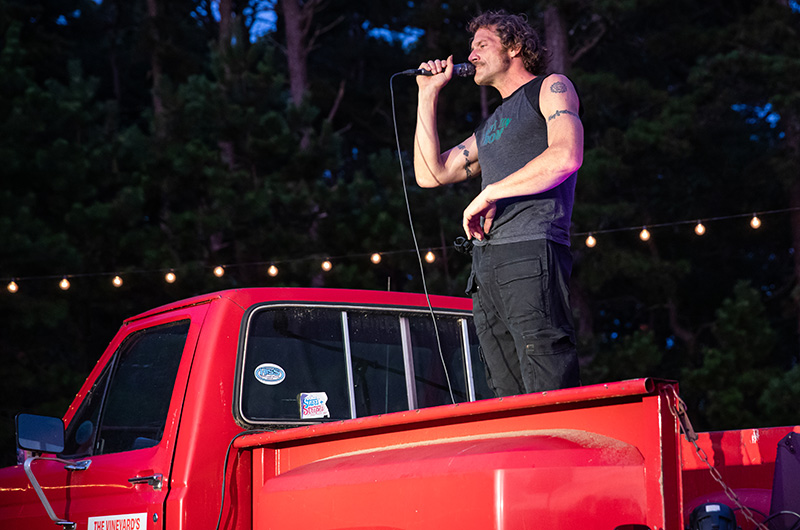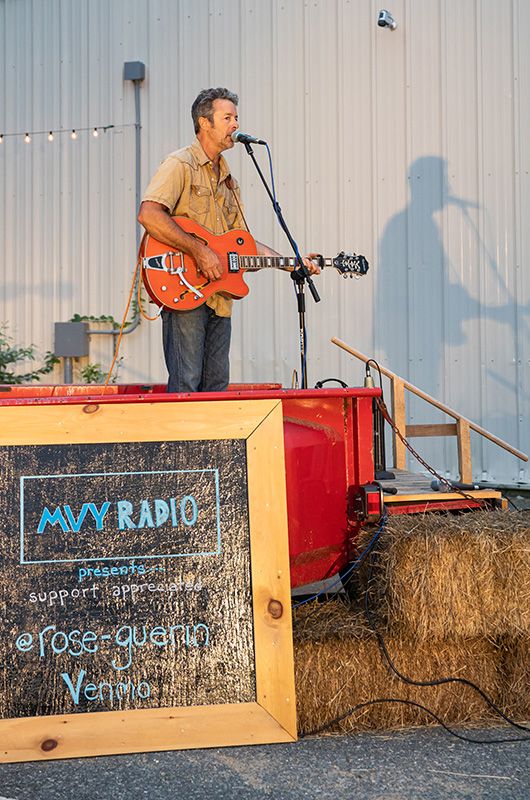Rose Guerin isn’t used to missing beats. A professional musician who spent years on world tour with her band Vandaveer, Ms. Guerin was recording her first-ever solo album and working full time at The Ritz before the pandemic began. When she wasn’t behind the bar, she was gloriously in front of it, performing as many gigs — with as many bands — as she could.
Then the pandemic hit. There were no more beats.
“There was literally nothing,” Ms. Guerin said. “It’s completely crazy. I worked at the Ritz, but if there’s no music, what am I doing there? Music is my life.”
Music also happens to be the life — and livelihood — of dozens of the Island’s many gigging performers, ranging from the infamous Johnny Hoy and the Bluefish to the Dock Dance Band, many of whom make between 60 to 80 per cent of their income (and in some cases, even more) playing live shows, year-round.
But when the government shutdown began in late March, live music, along with hundreds of other once unimpeachable facets of daily life, was deemed non-essential. There would be no restaurant shows, no bars, no weddings and no private parties. Even the church organ and choir — a sustainable form of income for some Island performers — went on hiatus.
The shutdown effectively delivered a death-blow to the Island’s once-bustling music scene, putting performers out of work and forcing musicians — almost none of whom qualify for unemployment — to get creative in order to survive.
So Ms. Guerin did.
Teaming up with MVY Radio’s Laurel Redington, the pair brainstormed a way to put musicians back on stage, a difficult task after the pandemic had literally brought the curtains down on every indoor venue.
“I was in my little center at the Ritz, and when the Ritz went away, we thought, we’ve got to find a way to get musicians back to work,” Ms. Guerin said. “Why couldn’t MVY do something? And Laurel said, I think we can.”
Ms. Redington contacted Brian Ditchfield, programming director of the Martha’s Vineyard Film Festival, which was also struggling to continue amidst the pandemic but had the clever idea of hosting drive-in movie nights behind the ice arena. Then they came up with the doubly clever idea of having the Island’s gigging musicians perform shows beforehand.
The checks would be tiny. The tip jar would be digital. It wasn’t much. But it was something.
“I’m always saying this, music is communion,” Ms. Guerin said. “All you want to do is to get on stage and perform for people. And it’s such an amazing opportunity to make that happen.”
Ms. Guerin did the first two shows and then came up with a list of performers. They included Shawn (Bones) Barber of the band Good Night Louise, the family-friendly Pinkletinks, Lydia Fischer, Kate Taylor and Jemima James. No one minded the small paycheck. They had nothing else.
After a few weeks, Ms. Guerin started matching the musicians with the movie, pairing them like wines. In pre-pandemic times, this might have been known as a “movie and a show.” Jeremy Berlin’s jazz trio did a set for the John Lewis documentary Good Trouble. Johnny Hoy and the Bluefish played before Jaws. The Dock Dance Band got ET. The people who showed up early didn’t do so just for a good spot to see the screen. They wanted to hear the music, too.
Ms. Guerin said that tippers started leaving messages on her Venmo. One said that they were heartbroken about not getting to see her at the Ritz.
“But then I got to see you here,” the message read, “and it made my whole summer.”
Despite the success of the drive-in shows, which have been extended and will run through at least the beginning of October, Island gigging musicians are struggling mightily. Their main stage is behind an ice arena on the back of a pickup truck. Maryse Smith, who performed at the drive-in about two weeks ago and has a toddler son, said it was her first time performing live in six months. She sang a cover of Bob Dylan’s Subterranean Homesick Blues, the rapid fire counterculture lyrics an eerie, poetic reminder of the music world’s current dystopia. Ms. Smith had always wanted to cover the song. The pandemic finally gave her enough time to learn the lyrics.
And it doesn’t take an economist — or a weatherman, in the words of Mr. Dylan — to know which way the wind has been blowing for performers these days.
“Most of my good friends are musicians and they are really struggling right now,” Ms. Smith said. “Most don’t have healthcare, or don’t have unemployment. And most of us barely made money in the first place. There’s no end in sight. It’s sad, and heartbreaking.”
Other full-time musicians have concocted additional creative solutions to the lack of traditional work. Guitarist Jemima James and Island Elderly Housing staffer Nora Wilcox had the idea of playing live, outdoor acoustic music for IEH residents that they could safely listen to through their windows. Ms. James said she got a “99 per cent” response rate, and has had Ellen Biskis, Phil daRosa, David Saw, Darby Patterson, her son Willy Mason, and others do shows.
Others went digital. Sean McMahon and Siren Mayhew, husband and wife musicians who make most of their income playing live shows on the Island, immediately started doing online, live-streamed “social distance-sings” when the pandemic began. The shows went well for the first few months, when people were cooped up inside, but started to fizzle once the weather improved.
They are now doing outdoor shows at the Community Baptist Church of Gay Head, where Mr. McMahon preaches. He is also teaching guitar online, and his band the Brothers McMahon, which combines Sean’s Bushwick-folk sensibilities with his brother Griffin’s Juilliard-trained organ skills, has played multiple shows at the drive-in.
But the couple, who have a two-year-old daughter Isla, said that the current situation was not sustainable, threatening the Island’s once-robust professional music community.
“I think it’s just been really tough on musicians,” Ms. Mayhew said. “I think there’s an impression out there that music is, or can be, a hobby for people. But Sean has a music degree. People get degrees in this, just the same as they might get a medical degree. This isn’t what we are trying to do. This is our career. So this has been really difficult, because the government has deemed our line of work non-essential.”
Mr. McMahon said the lack of agency for performers has been incredibly difficult as well. And despite business owners having the best intentions, including going to bat at the local and state level for live music, government orders have made it impossible.
“As musicians, we want to go out and create community,” Mr. Mayhew said. “And this is antithetical to that.”
All of the struggling performers were thankful for the drive-in shows organized by Ms. Guerin, Ms. Reddington and the MVFF. And considering her own situation, Ms. Guerin said she was lucky. The pandemic allowed her to finish the long-awaited solo album, which she hopes to put out sometime this fall.
That was a beat she couldn’t miss. The tour, of course, will have to wait.
“People miss live music. They miss it so much,” Ms. Guerin said. “But I think music will always survive.”
The MVFF drive-in movies and shows are continuing through at least the first weekend in October. Tickets can be purchased at tmvff.org/driveinschedule.









Comments (2)
Comments
Comment policy »